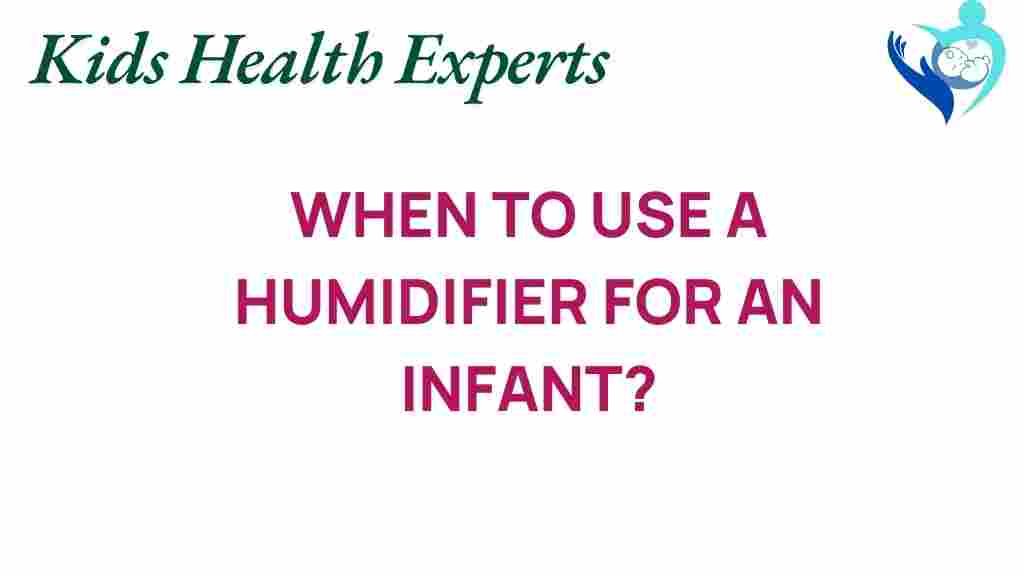When Should You Use a Humidifier for Your Infant’s Comfort?
As a parent, ensuring the comfort and well-being of your infant is paramount. One often-overlooked aspect of infant care is the air quality in your home. Seasonal changes can significantly impact this, making it essential to consider the use of a humidifier. In this article, we will explore when and why you should use a humidifier for your infant’s comfort, focusing on respiratory health and overall baby wellness.
Understanding the Importance of Humidifiers in Infant Care
Humidifiers can be a powerful tool in maintaining the right home environment for your baby. They help to add moisture to the air, which can be particularly beneficial during dry winter months or in arid climates. Here are some reasons why a humidifier can enhance your infant’s comfort:
- Improved Air Quality: Humidifiers help to prevent dry air, which can lead to discomfort for your baby.
- Respiratory Health: Maintaining adequate humidity levels can alleviate symptoms of colds and allergies.
- Skin Health: Proper humidity can prevent dry skin and rashes in infants.
- Better Sleep: A comfortable sleeping environment promotes better sleep patterns for your baby.
When to Use a Humidifier for Your Infant
Determining the right time to use a humidifier involves observing your baby’s needs and the air quality in your home. Here are some specific scenarios:
1. During Cold and Flu Season
When seasonal changes bring about colds and flu, a humidifier can be particularly useful. The added moisture in the air can help soothe your baby’s airways and reduce congestion, making it easier for them to breathe and sleep.
2. In Dry Climates or During Winter Months
In dry climates or during winter, indoor heating can significantly decrease humidity levels. If you notice your baby has dry skin or experiences nasal congestion, it may be time to introduce a humidifier.
3. If Your Infant Has Allergies or Respiratory Issues
If your baby suffers from allergies or respiratory issues such as asthma, using a humidifier can help alleviate symptoms. The moisture can keep airways open and reduce irritants in the air.
4. After a Vaccination
Some infants may experience increased nasal congestion after vaccinations. A humidifier can help relieve this discomfort and promote better child health.
Choosing the Right Humidifier
Not all humidifiers are created equal. When selecting a humidifier for your infant’s care, consider the following:
- Type of Humidifier: There are various types, including cool mist, warm mist, and ultrasonic humidifiers. Cool mist is generally recommended for infants.
- Size: Choose a size appropriate for your baby’s room. A small humidifier may not be effective in a larger space.
- Ease of Cleaning: Humidifiers require regular cleaning to prevent mold and bacteria growth. Look for models that are easy to disassemble and clean.
- Noise Level: Some models can be noisy. Look for a quiet option if your baby is a light sleeper.
How to Use a Humidifier Safely
Using a humidifier correctly is crucial for ensuring your baby’s safety and comfort. Here are some essential parenting tips to follow:
- Keep a Safe Distance: Place the humidifier out of reach of your baby, ideally on a table or shelf.
- Monitor Humidity Levels: Use a hygrometer to keep humidity levels between 30-50%. Too much humidity can lead to mold growth.
- Regular Maintenance: Clean the humidifier regularly as per the manufacturer’s instructions to prevent bacteria and mold.
- Use Distilled Water: This reduces the risk of mineral buildup and limits the dispersal of harmful particles into the air.
Troubleshooting Common Issues
Even with the best intentions, you may encounter issues while using a humidifier. Here are some common problems and solutions:
1. Humidifier Leaking Water
If you notice water pooling around your humidifier, check the water tank for proper placement. Ensure it’s securely fitted and that there are no cracks.
2. Unpleasant Odors
Stale odors can indicate mold or bacteria growth. Discontinue use and clean the humidifier thoroughly before using it again.
3. Not Enough Mist Output
If the humidifier isn’t producing enough mist, it may be clogged. Check the filter and clean any mineral buildup.
4. Excessive Humidity
Monitor the humidity levels. If they exceed 50%, turn off the humidifier or adjust its settings accordingly.
Conclusion
Using a humidifier can significantly enhance your infant’s comfort and contribute to their overall wellness. By understanding when to use it, how to choose the right one, and maintaining a safe home environment, you can promote better respiratory health for your baby. Always keep an eye on seasonal changes and your child’s specific needs, and don’t hesitate to consult with a pediatrician if you have concerns about your infant’s health.
For more information on improving your home environment for your baby’s health, check out this resource. Remember, a happy baby leads to happy parenting!
For further parenting tips and insights, you can read more on our parenting blog.
This article is in the category Care and created by KidsHealthExperts Team

2 thoughts on “When Should You Use a Humidifier for Your Infant’s Comfort?”